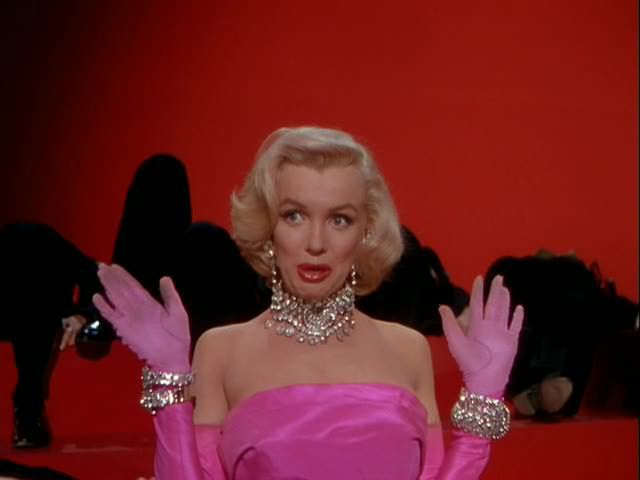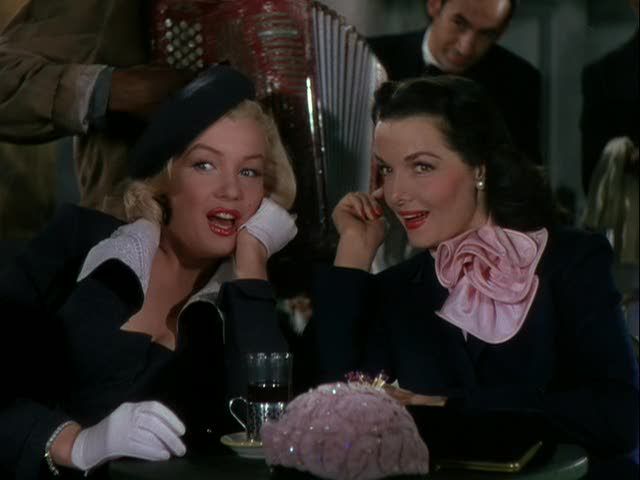
Today, Gentlemen Prefer Blondes is most fondly remembered for a single musical number which is pretty much the iconic Marilyn Monroe scene: her vampy, bubbly performance of "Diamonds Are a Girl's Best Friend." It's one of Monroe's most memorable scenes, as she coos and dances while delivering the lyrics that would come to personify, if not her true self, then at least the most true representation of her public persona. She's a cheerful, unabashed gold-digger here, surrounded by men who adore and lust after her, rejecting all their declarations of love as fickle, fleeting, and more often than not two-faced. It's easy to mock or dismiss Monroe's showgirl Lorelei Lee, who admits with a smile on her face that she's in love with money and wouldn't dream of marrying a man who wasn't rich. But underneath her brash forthrightness, barely concealed, are her fears, especially the fear of getting old, of losing her charms and her ability to make men fall in love. The "Diamonds" number, as upbeat as it is, is actually about a woman's insecurity in a world where she is judged for her physical beauty while a man is judged by his monetary success: Lorelei realizes that while women's assets are momentary at best, money and power doesn't dissipate with age. She believes that wealth is the only security against a woman's sad fate, of being cast aside for younger and prettier girls down the road. "Don't you know that a man being rich is like a girl being pretty?" she murmurs, so charmingly that it's hard to argue the point. "You wouldn't marry a girl just because she's pretty, but my goodness, doesn't it help?"
Sure, and it also helps when she's clever and self-aware and delightfully fun, all adjectives that apply perfectly to Monroe, perhaps more here than anywhere else. What comes through in this film is a sly, winking quality in Monroe's performance, a sense that she knows very well — as her character knows — the effect she can have on men, and that she's perfectly willing to conform, at least outwardly, to stereotypes if it'll get her what she wants. This seems to apply at least as well to the real Marilyn as it does to the bubbly, bouncy blonde Lorelei, and one suspects there's some truth to the rumor that Monroe herself suggested Lorelei's coy admission that "I can be smart when it's important, but most men don't like it." If a film as light and airy as this one can be said to have a theme, it's that women, living in a world with rules set by men, must erect elaborate facades over their true selves in order to exist comfortably.
Lorelei's best friend Dorothy (Jane Russell) doesn't see things the same way though, and where Lorelei loves only diamonds, Dorothy loves the company of men and the fun to be had on long nights with plenty of drinks and dancing. This duo of bombshells are opposites in almost every way — blonde and brunette, giggly and serious-minded, a whispery-soft murmur and a brassy tough-gal voice, a wide smile and a side-of-the-mouth smirk — but their friendship is nevertheless rock-solid. Russell and Monroe play off of each other beautifully, and it's a delight to watch them together, whether they're singing and dancing or trading fast-paced patter. They trade roles admirably in the comic scenes, taking turns playing the straight woman for one another. Sometimes Monroe's wide-eyed silliness sets up Russell for her deadpan one-liners, while at other times Russell simply stands back and lets her friend fire away.

With two such dazzling actresses at center stage, the plot doesn't have to do much besides stay out of their way, and for the most part it does. Lorelei's pending engagement to the goofy but sincere young millionaire Gus Esmond (Tommy Noonan) is threatened by Esmond's father (Taylor Holmes), who disapproves of his son marrying a showgirl. As a result, Lorelei and Dorothy head off to Europe together on a cruise, while Esmond's father hires the private detective Malone (Elliott Reid) to spy on Lorelei and gather incriminating evidence against her to halt the impending marriage. There's not a guy here who belongs in the same frame with these two, much less who can match wits with them as equals, and if the film has one weakness it's the necessity of believing that the tough Dorothy, who'd fit right in as a noir femme fatale, could fall for a wet blanket like Malone. Still, all these narrative detours are mainly an excuse to get Lorelei into hilariously improbable but incriminating circumstances, like the moment where an over-eager big-game hunter (Charles Coburn) demonstrates to Lorelei how a python kills a goat by strangulation. How would that be incriminating, you ask? "Well," Lorelei explains, "he was the python... and I was the goat!"
If the plot is largely decorative, so too are the many musical numbers, which are primarily designed as showcases for the girls and their ample charms. The "Diamonds" performance is undeniably director Howard Hawks' best musical piece, a gaudy delight of costume design and choreography: Monroe in a pink strapless dress that seems to be just barely clinging to her bosom, twirling and singing amidst crowds of valentine-toting tuxedo-ed men and ballerinas with black gauze masks drawn across their faces, all of it against a cartoony red backdrop that sets off the deep blacks of the tuxes. The opening number, "Two Little Girls From Little Rock," is similarly opulent, setting the girls' bright red dresses off against a similarly bold blue curtain. The film's palette favors primary colors, including the ever-present bright red of the girls' lips, while the wardrobes mostly cycles through a series of radiant green, blue, and red hues. As a result, even the less showy musical pieces, like "When Love Goes Wrong" and "Bye, Bye, Baby," have an impromptu charm that's hard to resist: they seem like pick-up songs casually performed with whatever passersby happen to be around, gathering performers from among the bystanders for a bit of song and dance.
Above all, this is a fun and light-hearted film, driven by the comedic performances from both stars. Howard Hawks seems to have ceded the film to Monroe and Russell, and there's very little sign of the auteur's signature concerns or style, except perhaps in the staging of the musical numbers, which seem at times like crowd scenes with an infectious sense of rhythm. The film as a whole has this same underlying rhythm, a propulsive beat that drives the songs and the comedic bits alike. It's the pulse, perhaps, of the men who come into contact with Monroe and Russell: hearts pounding like mad, dizzy smiles plastered across their faces.

2 comments:
"When love goes wrong" number is definitely one of the film's very sweet moments, amid all those diamonds.
Todd McCarthy's superb Hawks biography confirms the longstanding rumors that the musical sequences in Gentlemen were conceived and directed by choreographer Jack Cole, with little to no imput from Hawks.
Post a Comment